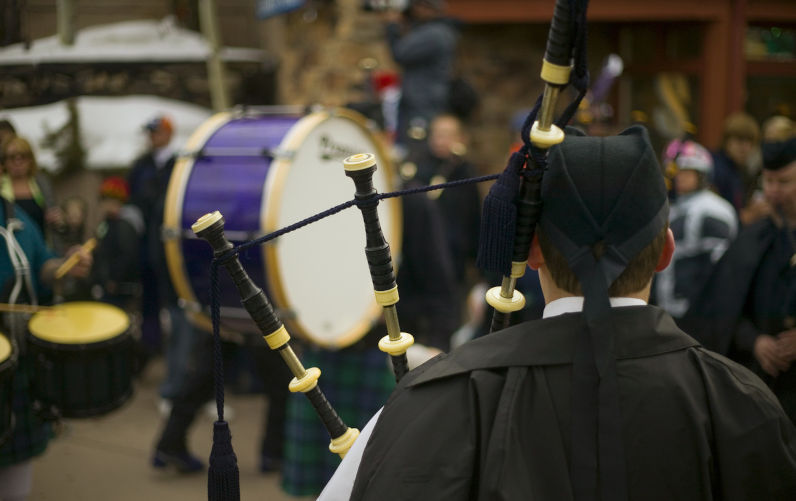Can music conquer all? You bet
May 12, 2024
“It’s a bit silly in this day and age but that’s how it is.”
Russell Chapman is well-placed to talk about what he’s called the “West of Scotland disease”. That is the continuing bitter rivalry between Rangers, “the Queen’s team”, and Celtic, with its “loyalty to [the church of] Rome”.
As a five or six-year-old, Russell remembers being taken by an uncle, “much to the annoyance of my Mum and Dad” in the 1960s to “Old Firm” matches with crowds well in excess of 100,000. He saw “a bit of hooliganism” but for him “it was just the football”, albeit, with a strong and lasting loyalty to the notion of a Protestant Great Britain.
“I get a bit emotional when I talk about the Crown, especially the Queen,” says Russell, who for more than 30 years has run the Sydney Glasgow Rangers Club, and well knows the history between the clubs, which has often come with violence.
It was immigration from northern Ireland in the late 19th century that led to the establishment of Celtic in Glasgow. The great rivalry with Rangers has been widely documented, from the horror that was the 1980 Scottish Cup final riot to the recent years of growing acceptance and rapport.
But there is another northern Irish raid on Scottish culture that might not be quite so well-known.
Pipe bands from northern Ireland are among the very finest in the world.
Indeed, Field Marshal Montgomery Pipe Band, based in Lisburn (pop 45,000), eight miles from Belfast, leads the way.
Founded in 1945, it has won 13 world championships, and finished second or third a further 13 times.
Among their number has been piper Donald MacPhee, who in nine seasons with FM (2005-2014) was part of 33 major-championship wins, including 6 world titles, and 2 grand slams (the five majors in a single season).
So, why do northern Irish pipe bands do so well? It’s a drive certainly, but a most peaceful and inclusive one. Music really does conquer all, it seems.
“Religion doesn’t come into playing with the band,” MacPhee says, adding that Northern Ireland bands are “compacted in a lot smaller area”, whereas Scotland was much more spread out, with pipers not moving so freely between Edinburgh, Glasgow, Aberdeen and a number of other piping centres.
FM got to compete “basically 11 times in a season” while those in Scotland were going to majors only or competing six, “or maybe 7 tops”, times.
Councils got on board, supporting competitions financially because the pipe-band scene was not driven by “any religious undertones”.
“Northern Ireland needed an avenue that was a safe avenue that was not loyalist or republic-driven … there are pipe bands that represent both sides, but when it comes to competition, that was never, and has never been, discussed,” he continued. “Never in my time of competing, adjudicating and going over there was there any kind of issues with that.
“It’s a healthy atmosphere for people to grow through and to grow up in …piping and the music being most important.”
MacPhee noted the early efforts of Sam Baillie, who ran the Northern Ireland School of Piping and Drumming, which established an examination process for piping that was nearly the same for piping as the Associated Board of the Royal Schools of Music (ABRSM) and Trinity College were for other musicians. This came complete with a grading system, from 2 to 8, with the 8s sharing the rarefied air of concert pianists or symphony-orchestra players.
MacPhee gave much credit to the Royal Scottish Pipe Band Association Northern Ireland Branch for creating “a very active scene”, and doing so earlier than Scotland. He spoke of George Ussher, Kenny Currothers and Mervyn Herron among others.
“These gentlemen made sure there was a contest every Saturday, with bands a lot closer to one another than the bands in contest in Scotland,” he said.
MacPhee, originally from Detroit, made Scotland home in 1997 in his early 30s after living in Florida and then Texas, and after visiting for many summers to compete in piping championships.
His love for Rangers owes absolutely nothing to any sectarian angle.
His barber in Houston was from Scotland and decided to go halves in a pub with the unappealing aspect of being “in a corner in a strip shopping plaza”. People couldn’t find the place so the barber prevailed on MacPhee to play pipes on a median strip with two-way traffic on either side and a sandwich board (only placed beside the piper after it was gently explained to the barber that it was impossible for even a player of MacPhee’s calibre to play pipes while wearing the thing.)
The barber loved his Scottish football, with the regular 3pm Glasgow kick-offs translating to 9am in Houston, but his liquor licence didn’t kick in until 11, so ….
He flew in the ingredients and laid on “old-country breakfasts” with the punters staying to have a drink at match’s end.
“Rangers were in the middle of their great run [nine titles in a row],” MacPhee recalled. “My fee, as one would say, was a free breakfast and to watch the game”, seated next to the barber.
The barber was a mad Rangers fan and “happiness loves company” so MacPhee became one too: “that was the start of a beautiful relationship.”
MacPhee has not missed a Rangers match in more than 24 years, his wife, Christine, getting him his season tickets. He always sits next to Willie McCallum, rated by many the greatest solo piper of the past century (an unmatched 29 straight invitations to the Glenfiddich solo championship and an unsurpassed nine wins).
Those still looking for trouble in the terraces or in the streets around Ibrox and Celtic Park would do well to have a listen to the words, and music, of this gentle pair of football fans.

